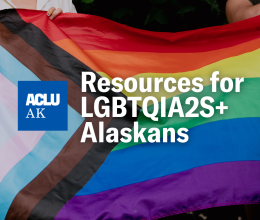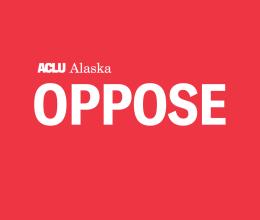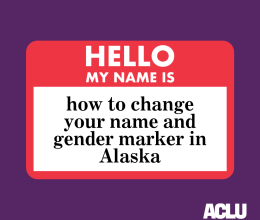
Two weeks ago, the ACLU of Alaska sent a letter on behalf of a transgender middle school student-athlete on the Kenai Peninsula who has been barred from participating on the boy's cross-country team.
This fall, the student* joined the cross-country running team, a non-contact sports team open to all cisgender seventh graders without an athletic tryout. The student loves running and loves the team; being part of it has been a crucial aspect of their adjustment to seventh grade and their new school. Their mother has described cross-country running as “bringing a new light into [their] life.”
The student has been running with the boys during practices, consistent with their gender identity and with their coach’s support. But the student was informed they would only be permitted to run with the girls’ team at meets. After attempting to participate with the boys’ team, the student was told they could not attend any more away meets, effectively suspending them from the cross-country team.
Blocking the student from participating in middle school athletics in accordance with their gender identity is discriminatory and violates their constitutional and statutory rights.
The ACLU of Alaska’s Legal Director, Ruth Botstein, outlined the following violations of the student’s rights in the letter sent to Kenai Peninsula Borough School District (KPBSD).
- Blocking the student from participating in middle school athletics violates the School District's own policies. Although the ASAA’s (Alaska School Activities Association) bylaws and policies apply statewide to member schools’ high school-level sports and activities, ASAA bylaws make clear that ASAA does not regulate athletics at the middle school level. The KPBSD Middle School Handbook SY 2023-24 contains no specific policies regarding transgender or non-binary student-athletes. It does not even authorize the middle school to have gender-segregated teams for cross-country running at all.
-
The District’s choice to discriminate against the student violates the Equal Protection Clause of the United States and Alaska Constitutions. Just last month, the United States Court of Appeals for the Ninth Circuit affirmed the decision to block an Idaho statute banning transgender girls from participating on girls’ sports teams. The Ninth Circuit held that “discrimination on the basis of transgender status is a form of sex-based discrimination.” Ninth Circuit law applies to Alaska.
Barring the student from the boys’ cross-country running team does nothing to increase athletic opportunities for cisgender girls because the student would not be competing against cisgender girls. Cross-country running is not a contact sport, so there is no basis for a safety concern about injuries that could result from mixed-sex participation. The middle school’s running team is open to all cisgender students and does not require a tryout, so there is also no basis for a concern that allowing transgender or nonbinary athletes would decrease opportunities for cisgender girls to participate on the girls’ team or in girls’ sports generally.
-
The District’s actions violate the student’s privacy rights. A person’s transgender status is “private, sensitive personal information” that is entitled to constitutional protection. A government action that “outs” a person by making public the difference between their gender identity and their sex as assigned at birth violates that right because it is a forced government disclosure of the transgender person’s private medical information and transgender status. The student does not present or identify as a girl; the fact that they were assigned female at birth and now do not identify as female is their personal and private information to share if and how they want—not the District’s. Forcing them to participate on a girls’ team would out the student as transgender in violation of their constitutional privacy rights.
-
Title IX bars KPBSD from excluding the student from the boys’ cross-country team. KPBSD unquestionably must comply Title IX as required both by federal law and by explicit KPBSD policy. Title IX does not allow the middle school to discriminate against the student based on their gender identity by excluding them from the boys’ running team.
Courts addressing the issue have concluded that a ban of transgender students (in those cases, transgender girls) from interscholastic athletic teams in accordance with their gender identities are likely to be unlawful under Title IX.
-
Suspending the student from participating in away meets without a hearing appears to have violated their Due Process Rights and District policy. The KPSAA handbook provides that before they are suspended from a team, student-athletes have a due process right to notice of the charges against them, an explanation of the evidence against them, and the right to present their view of the events leading to suspension from the team. Due process must be provided “[p]rior to any disciplinary action taken,” and a hearing must be held “as soon as knowledge of a violation is known to the school.” The school’s post-hearing decision must also be provided in writing to parents to enable them to appeal.
The school has followed none of these procedures concerning the student's suspension from away cross-country meets, violating its own written policies and denying the student due process.
The ACLU of Alaska sent this letter urging KPBSD to reconsider its decision, immediately reinstate the student to the team, and allow them going forward to participate on the boys’ team consistent with their gender identity.
Two weeks ago, in response to our letter, the District reversed course. The student was allowed to race with the boys’ team during the Friday, September 22nd meet and had a great meet.
We appreciate the quick work of the KPBSD to change course and allow the student to participate in the rest of their cross-country season. We will continue to work with school districts across the state to ensure that student activity policies are inclusive of all students and protect rights enshrined under the U.S. and Alaska Constitutions.
The ACLU of Alaska is committed to fighting back against policies, regulations, and government actions that are unconstitutional and perpetuate anti-trans rhetoric. We applaud the bravery of this student and their parents for speaking out and advocating that their rights be upheld and be treated with respect.
If you have been affected by these types of anti-trans policies, have children who have been discriminated against, or are a coach or administrator tasked with implementing these policies and want to know more about your legal rights, please reach out to ACLU of Alaska staff attorney Melody Vidmar at [email protected].
*The student’s name and school have been redacted and would like to remain anonymous at this time.



